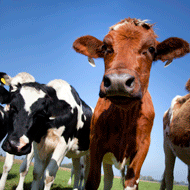
System could improve animal health and welfare
Scientists are working on a new system to alert cattle farmers to the risk of disease.
The Y-Ware project is aiming to develop a bolus sensor which could be used in calves as young as 14 weeks and a dashboard offering access to customisable reports.
Researchers say the dashboard will give farmers and vets essential information on individuals and groups of animals. The development could save farmers millions of pounds, improve animal health and welfare and reduce antibiotic use.
Dr Jasmeet Kaler, professor of epidemiology and farm animal health at the University of Nottingham said: “Improving young stock health on cattle farms is a key priority for the cattle industry and also been identified by industry task force RUMA as one of the key targets released last week for antibiotic reduction on cattle farms especially beef.
“In this project, we are leading data analytics working alongside our partners. We will utilise our domain knowledge with regard to our understanding of disease biology and epidemiology with various machine learning approaches on the data gathered via sensors.
“Our overall aim will be to develop an innovative technology that combines different formats of data, uses application of Internet of Things and advanced analytics for early detection of disease in young stock and thus allowing targeted use of antibiotics."
Cattle farms are facing huge challenges in remaining profitable while retaining high standards of animal care. Every year, around eight per cent of calves are born dead or die within 24 hours. A further 15 per cent die in rearing from diarrhoea and pneumonia, costing the industry £80 million.
Bolus sensors, which sit in an animal’s gut and track body temperature or pH, are in widespread use in cattle - but are currently only available for adult cows. There are also many technologies on farms that don’t talk to each other which limits the predictive value of such data.
The £1.13million Y-Ware Project is a collaboration with farming digitalisation specialists PrognostiX and BT, supported by a grant from Innovate UK, the UK Government-funded innovation agency.
Alan Beynon, director of PrognostiX said: “This is a very exciting time for veterinarians in practice in all sectors of agriculture as the pressure to reduce antimicrobials is current and pressing. The use of real-time data to make clinical decisions is an integral part of where the future will be alongside better diagnostic facilities. We are delighted to be working alongside our dynamic partners Nottingham University and British Telecom.”
Martin Tufft, IoT director at BT added: “We’re providing expertise around data science and analytics, exploring the data generated from multiple sensors with a view to developing unique algorithms and machine learning techniques to support the project.
"The application of advance data analytics is key to the success of IoT solutions and we look forward to helping this project provide valuable information for the farming industry.”



 The Veterinary Medicines Directorate (VMD) is inviting applications from veterinary students to attend a one-week extramural studies (EMS) placement in July 2026.
The Veterinary Medicines Directorate (VMD) is inviting applications from veterinary students to attend a one-week extramural studies (EMS) placement in July 2026.